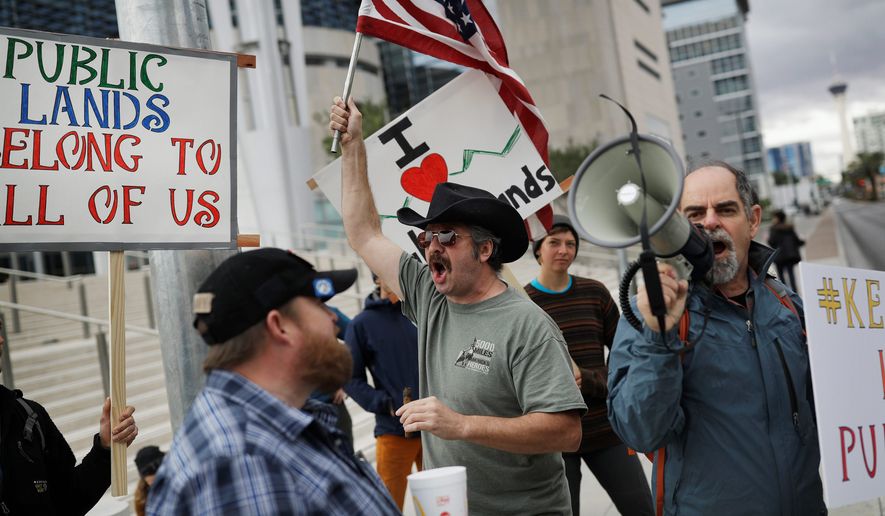The men charged in connection with the 2014 armed standoff at the Bundy ranch are hoping that a Bureau of Land Management agent with a taste for Burning Man will derail the government’s case against them.
Jury selection began Monday in the first of three trials on the showdown at the Bundy ranch near Bunkerville, Nevada, but defense attorneys have already moved to dismiss the charges against at least two of the 17 defendants based on the agent’s conduct.
The supervisory agent, whose name has not been released by the government but who is believed to be the same one in charge of the Bundy ranch operation, was accused of misconduct in an Interior Department Office of Inspector General investigation.
The report on the investigation, released Jan. 30, said that the supervisory agent obtained free Burning Man tickets and passes for family and friends, drove around his girlfriend in a government vehicle, allowed her to share his trailer and manipulated the hiring system on behalf of a friend.
In court filings posted online by Bundy supporter Deb Jordan, defense counsel argued that the investigation by the Interior Department Office of Inspector General should have been disclosed previously.
The motions and several news outlets, including The Arizona Republic, identified the BLM supervisory agent as Daniel P. Love.
“OIG’s ongoing investigation of Love and the information it received from witnesses attesting to [the agent’s] threats, dishonesty, lack of candor, malfeasance, and misconduct constitute Brady information the government was constitutionally required to disclose to the defense,” said attorneys for Ryan Payne in their motion.
The Burning Man brouhaha comes as an unexpected hurdle for federal prosecutors as they prepare for the first of three trials stemming from the April 2014 standoff between the BLM and Nevada’s government-resisting Bundy family.
Federal prosecutors were stunned when an Oregon jury returned not-guilty verdicts against seven defendants, including Ammon and Ryan Bundy, for their role in the January 2016 occupation at the Malheur National Wildlife Refuge.
The prosecution was later criticized for overreaching by charging the defendants, who described the occupation as a protest against federal public lands policy, with federal conspiracy instead of lesser counts such as trespassing or vandalism.
In the Nevada case, a federal jury in Las Vegas handed down indictments against the leaders of the Bundy ranch uprising on 16 felony charges, including conspiracy, assault on a federal officer and weapons offensives.
U.S. District Court Judge Gloria Navarro has since dropped one of the charges, but the remaining counts could still put rancher Cliven Bundy and two of his sons behind bars for over 100 years.
The court has broken up the trial into three parts. The first six men — Gregory P. Burleson, O. Scott Drexler, Todd C. Engel, Richard R. Lovelien, Eric J. Parker and Steven A. Stewart — are considered low-level operatives, also described as gunmen.
Three Bundy family members — father Cliven and sons Ammon and Ryan — are scheduled to go on trial as part of the first tier of defendants, which takes place 30 days after the conclusion of the first phase. Sons Mel and Dave Ryan were included in the second tier, which takes place 30 days after the conclusion of the second trial.
Justin Pidot, former Interior deputy solicitor, said the outcome of the trial will send a signal to federal workers charged with managing public lands.
“I think it’s significant because federal employees — land managers, people who are out there on the ground working on public lands — I think they feel unsafe following the Oregon verdict,” said Mr. Pidot, who teaches at the University of Denver Sturm College of Law. “They feel shaken. They feel like the legal system isn’t designed to protect them doing their jobs.”
Having said that, the law professor predicts the defendants will be acquitted in the Nevada case.
Hundreds of Bundy supporters, some of them armed, descended on the ranch after the BLM tried to impound his cattle in response to a 20-year battle over grazing fees with Cliven Bundy. Mr. Bundy had refused to pay his grazing fees to the BLM, saying he would pay local government instead in a protest against federal land management.
“I expect that we will not see another acquittal, but if we saw all three of the Nevada trials go in the same direction, there would just be a huge signal sent that if you want to go on federal land, wave your gun around and point it at people out there trying to do their jobs, then that’s just OK,” Mr. Pidot said.
The BLM ultimately abandoned the effort over concerns about violence, but last year agents arrested Cliven Bundy in Portland when he arrived to visit his sons in jail.
The annual Burning Man event is held in the Black Rock Desert in northern Nevada, drawing up to 70,000 attendees who celebrate art, community and alternative lifestyles.
• Valerie Richardson can be reached at vrichardson@washingtontimes.com.




Please read our comment policy before commenting.